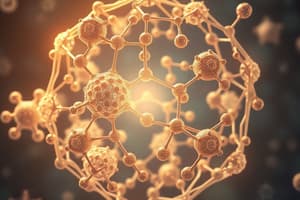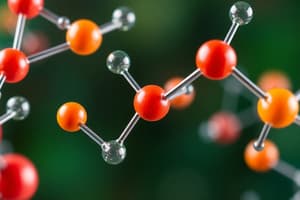Podcast
Questions and Answers
Which type of bond is primarily responsible for the formation of organic compounds?
Which type of bond is primarily responsible for the formation of organic compounds?
- Hydrogen bonds
- Covalent bonds (correct)
- Ionic bonds
- Metallic bonds
What is true about a compound compared to a molecule?
What is true about a compound compared to a molecule?
- A compound can only consist of one type of atom.
- All compounds are also molecules. (correct)
- Compounds cannot exist without molecules.
- A molecule must contain different kinds of atoms to be a compound.
Which of the following elements is NOT considered a major component of living organisms?
Which of the following elements is NOT considered a major component of living organisms?
- Oxygen
- Carbon
- Lead (correct)
- Hydrogen
How many covalent bonds can a single carbon atom typically form?
How many covalent bonds can a single carbon atom typically form?
Which of the following statements accurately describes molecules and compounds?
Which of the following statements accurately describes molecules and compounds?
Which type of reaction involves the removal of a water molecule to form a new bond?
Which type of reaction involves the removal of a water molecule to form a new bond?
What is the main energy storage form of glucose in animals?
What is the main energy storage form of glucose in animals?
Which of the following is classified as a monosaccharide?
Which of the following is classified as a monosaccharide?
What is the primary structural purpose of cellulose in plants?
What is the primary structural purpose of cellulose in plants?
The process of adding water molecules to break a bond is known as what?
The process of adding water molecules to break a bond is known as what?
Which carbohydrate has a 1:2:1 ratio of carbon, hydrogen, and oxygen atoms?
Which carbohydrate has a 1:2:1 ratio of carbon, hydrogen, and oxygen atoms?
What type of carbohydrate is formed from the joining of two monosaccharides?
What type of carbohydrate is formed from the joining of two monosaccharides?
Which of the following carbohydrates is primarily used for energy storage in plants?
Which of the following carbohydrates is primarily used for energy storage in plants?
What term refers to the smaller building blocks that make up macromolecules?
What term refers to the smaller building blocks that make up macromolecules?
In aqueous solutions, monosaccharides most commonly form what type of structures?
In aqueous solutions, monosaccharides most commonly form what type of structures?
Flashcards are hidden until you start studying
Study Notes
Chemistry in Biology
- The science of Biology is based on chemistry
- The interaction of chemicals determines everything from birth to death
- Chemistry is used daily in everyday life
- Cooking
- Cleaning
- Bathing
- Watering plants
Atoms, Molecules, Compounds
- Atoms are the fundamental building blocks of all molecules and chemical compounds
- Atoms interact with other atoms through chemical bonds
- Chemical bonds define how chemical compounds form, break down, and reform
The Chemistry of Life
- Organisms are composed mainly of:
- Oxygen
- Carbon
- Hydrogen
- Nitrogen
- Humans also contain small amounts of sodium, phosphorus, sulfur, and chlorine
- Molecule: When two or more atoms are chemically bonded together
- For example, H2 (hydrogen gas)
Chemical Bonds
- Atoms can chemically bond in three ways:
- Ionic bonds
- Covalent bonds
- Hydrogen bonds
Organic Compounds
- Contain carbon atoms
- Carbon atoms have four valence electrons, which can covalently bond to up to four other atoms
- This property allows carbon to create an almost endless array of carbon-based structures
- Range in complexity from simple methane (CH4) to complex ring and chain structures
- The reactivity of organic compounds in water makes them useful in biological systems
- Organic compounds are also called macromolecules
- They are made up of smaller building blocks called monomers
- Monomers are joined together by condensation (dehydration) reactions and broken apart by hydrolysis
Dehydration and Hydrolysis Reactions
- Condensation (dehydration) reactions: Monomers join to form a larger molecule by removing a water molecule.
- Hydrolysis reaction: Larger molecules are broken down by adding a water molecule
Four Important Organic Compounds
- Carbohydrates
- Lipids
- Proteins
- Nucleic Acids
Carbohydrates
- The most prevalent organic molecules in organisms
- Composed of carbon, hydrogen, and oxygen in a ratio of about 1:2:1 (e.g., C6H12O6)
- Serve as an energy source for the body
- Many carbohydrates are saccharides (sugars)
- Glucose is a key monosaccharide (simple sugar)
Classification of Carbohydrates
- Monosaccharides: Single-sugar molecules (e.g., glucose, fructose, ribose, galactose)
- Disaccharides: Formed by joining two monosaccharides via a glycosidic linkage (e.g., sucrose, lactose, maltose)
- Oligosaccharides: Longer chains (polymers) of monosaccharides (oligo= few, and poly= many)
- Polysaccharides: Complex carbohydrates, long chains (polymers) of monosaccharides (e.g., glycogen, starch, cellulose)
Polysaccharides
- Glycogen: A polysaccharide that serves as energy storage in animals and stored in muscle and liver tissues
- Starch and Cellulose are polysaccharides in plants
- They are long chains of glucose molecules, but arranged differently than glycogen
- Starch: Major energy storage form of glucose in plants
- Cellulose: Structural polysaccharide in plants
Glucose: Chain and Ring Structures
- In solution, monosaccharides form ring structures
Studying That Suits You
Use AI to generate personalized quizzes and flashcards to suit your learning preferences.




